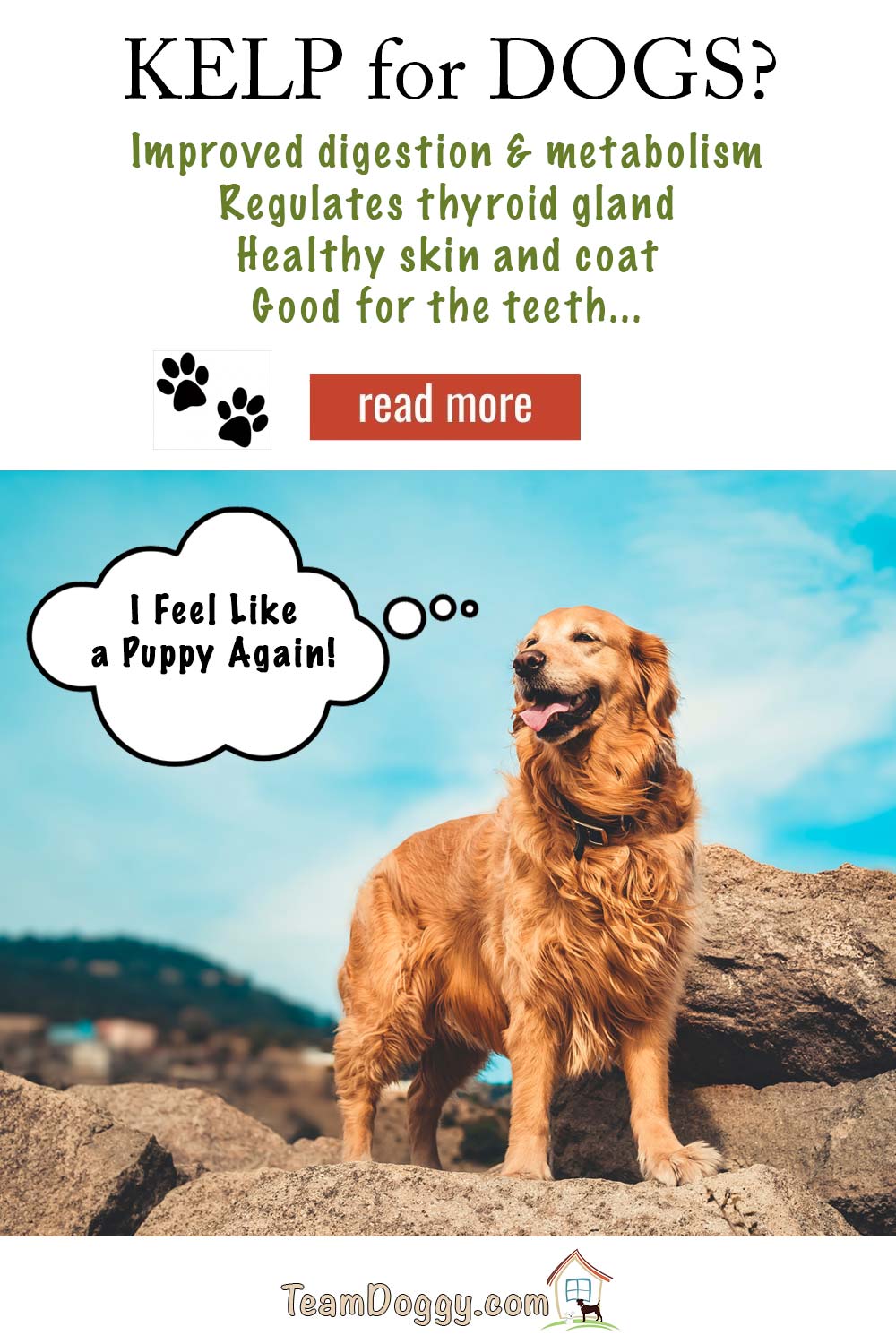
We recently discovered the importance of kelp for dogs after hearing about a friend’s aging Golden Retriever.
Sammy’s humans, our dear friends, were worried about their old dog. He had always been a healthy and active pup, but recently he’d started to slow down and gain weight. His coat wasn’t looking as shiny and healthy as it used to either.
The family took Sammy to the vet, who ran some tests. It turned out that Sammy was developing hypothyroidism due to a lack of iodine in his diet. With some medication and dietary changes, Sammy got better quickly! He was back to his old self, running around and playing with his ball like never before.
One of the key changes and recommendations from the vet was to introduce kelp into his diet. Who knew! Not having lived by the ocean Sammy’s parents wouldn’t have guessed in a million years that their dog needed to eat seaweed. But not any old seaweed will do, in fact some kinds of seaweed are bad for dogs.
That being said, Dr. Ernie Ward, DVM, CVFT (a veterinary food therapist) raves about the many benefits kelp provides dogs. Dr. Ward is the Co-author of the book The Clean Pet Food Revolution and all around super dog diet guru.
Table of Contents
- What Are the Benefits of Kelp for Dogs?
- How Much Kelp is Good For Dogs?
- What is the Best Way to Give Dogs Kelp?
- Where to Buy Kelp For Dogs?
- Wholistic Pet Organics Sea Kelp
- Starwest Botanicals Organic Kelp
As a nutritional superfood kelp can give your dog a higher quality of life, and potentially extend their life expectancy when given as part of a healthy nutritious diet.
What Are the Benefits of Kelp for Dogs?
Kelp is a type of seaweed that is packed with nutrients and minerals. It is a rich source of iodine, which is essential for thyroid health, and it also contains calcium, magnesium, and iron. In fact, kelp contains an astounding 60 different vitamins and minerals and 21 amino acids, making it an amazing superfood to add to your dog’s diet.
Kelp can be found in powder, capsule, or liquid form, so it can easily be added to your dog’s food or water. Some of the benefits of kelp for dogs include:
- Improved digestion and metabolism: Sea kelp is great for supporting healthy digestive function because it’s what is called a prebiotic. Prebiotics work alongside probiotics to increase the gut microbial population. Sounds daunting but the dietary fiber kelp provides supports the growth, activity, and diversity of beneficial bacteria while reducing bad bacteria and pathogens.
- Promotion of healthy skin and coat: Kelp helps reduce inflammation which gives your dog relief from allergies and hot spots that cause them to itch and scratch.
- Regulates thyroid, adrenal, and pituitary glands: The iodine in kelp helps these glands maintain normal function. When these glands are optimized it gives your dog a healthy metabolism, weight regulation, and energy levels.
- Detoxification of the body: Since 70% of our dogs’ immune system is maintained in the gastrointestinal tract the many nutrients in sea kelp contribute to a strong immune response and helps detoxify the GI tract by eliminating bad bacteria.
- Good for the teeth: Kelp contains Alginic acid which helps reduce dental plaque and tartar buildup
If you are looking for a natural way to boost your dog’s health, kelp is definitely worth considering. Just make sure to consult with your veterinarian first to make sure it is appropriate for your dog.
How Much Kelp is Good For Dogs?
While kelp does contain a variety of nutrients that can be beneficial for dogs, it is important to give kelp to dogs in moderation. Too much kelp can even cause gastrointestinal distress and may even lead to thyroid problems because too much iodine is just as bad, or worse, than not enough.
The best way to give your dog the benefits of kelp is to add a small amount to their food. The recommended dosage of kelp for dogs is ¼ teaspoon per 10 lbs of body weight per day. Increase gradually as needed only if recommended by a veterinarian because your dog is nutrient deficient. Of course if your dog is already taking recommended iodine supplements, or your regular dog food contains iodine, additional kelp should not be added.
If your dog shows signs of weakness, diarrhea, or vomiting cut back on the amount of kelp they are getting and consult your veterinarian.
Too much iodine in a dogs’ diet can cause goiters, an enlarged thyroid gland, and even in extreme situations thyroid cancer. Hyperthyroidism is when the thyroid gland is over producing which can lead to too much weight loss.
Aside from the scary effects of too much kelp, in small proper amounts sea kelp has tremendous benefits for our dogs’ health. Just be careful to take it slow. Too much of a good thing can be bad too.
What is the Best Way to Give Dogs Kelp?
As stated some dry dog foods already contain added iodine so check your label first. If you see that your dog is not already getting these key nutrients there are many ways to include kelp in their diet.
One of the best ways to give dogs kelp is in the form of kelp powder. Kelp powder can be sprinkle on your dog’s food or mixed into their water. Kelp powder allows you to start with a small amount and slowly increase the dosage as needed. Some other ways to give your dog kelp include adding it to homemade dog treats or feeding them raw, dried Kelp. If you are very careful about serving size human kelp or seaweed products can also be used.
No matter how you choose to give your dog kelp, they are sure to reap the many benefits this superfood has to offer.
Where to Buy Kelp For Dogs?
Even if you don’t live near the ocean where kelp grows naturally you can find kelp products pretty much everywhere. Pet stores, grocery stores, health supplement stores and of course anywhere you usually shop online for pet or human food.
Just keep an eye on those ingredient labels. As with most products some companies throw in unnecessary cheaper ingredients as fillers and preservatives. In the case of our dogs we want to give them the best possible health benefits.
If you go with organic kelp products you’ll be good to go, but that doesn’t mean you have to break the bank. Often times “pet kelp” is simply kelp powder made for humans with a higher price tag because it’s suddenly made for dogs. So the best kelp powder for dogs is oftentimes not even marketed for dogs – just us kelp loving people.
Wholistic Pet Organics Sea Kelp
If you are looking for a trusted organic kelp for your dog Wholistic Pet is a good choice. Wholistic Pet is run by a family that cares about their and our pets. Harvested and processed in Northwest Iceland at the highest standards you can’t go wrong by choosing this powdered Icelandic kelp. Looking at the ingredients list will reassure you because the only ingredient is kelp. Just the way it should be.
Starwest Botanicals Organic Kelp
While Wholisic Pet Organics is a wonderful brand with a line of pet supplements for all your pets’ dietary and health needs there is something to be said for the good ‘ole cheap options. Bulk kelp powder for humans. Essentially the same thing – organic kelp as the only ingredient but without the fancy packaging and marketing.
Starwest Botanicals has over 3000 herbs, spices, teas, and other natural products – for humans. But that doesn’t mean we can’t share with our pets. Their bulk kelp may not look all fancy shmancy but it’s just the same high quality kelp as you’ll find at the pet food store. At a fraction of the price.
No matter what kind of sea kelp you buy, your dog will be back to his old self, running around and playing with his ball like never before. Just like Sammy.











